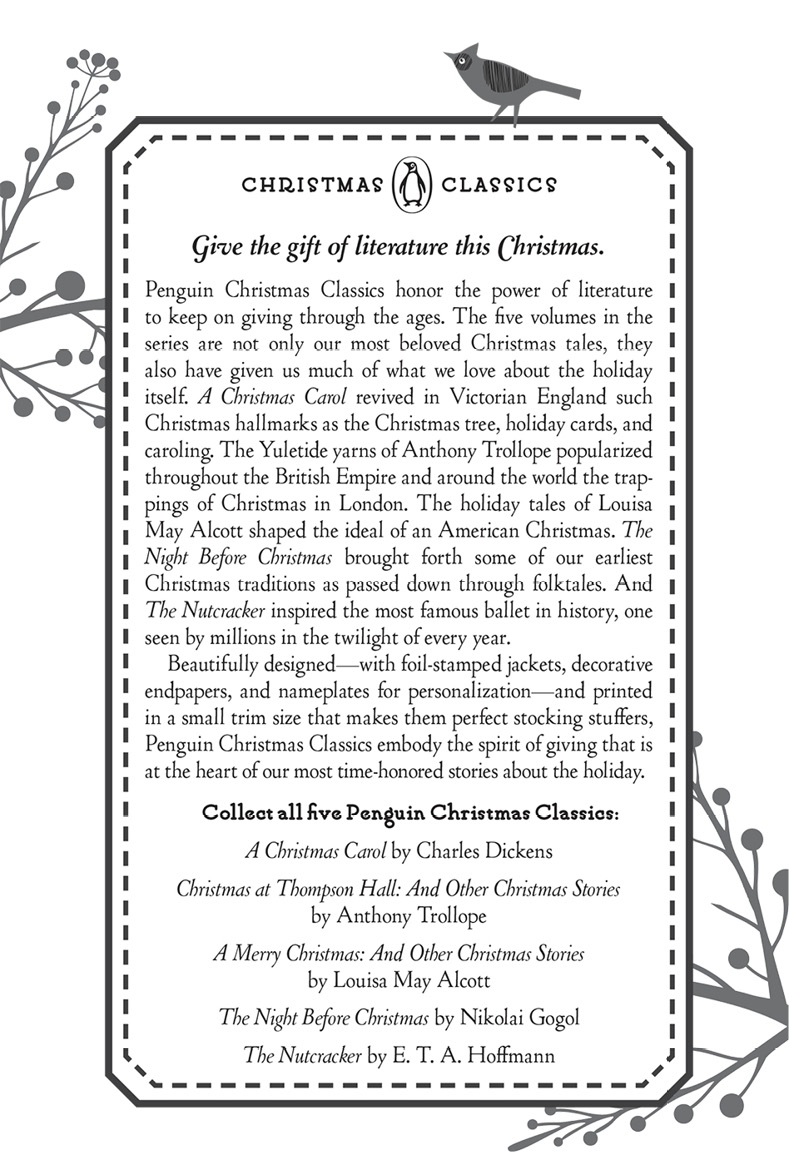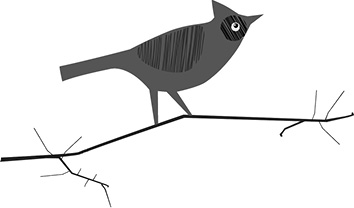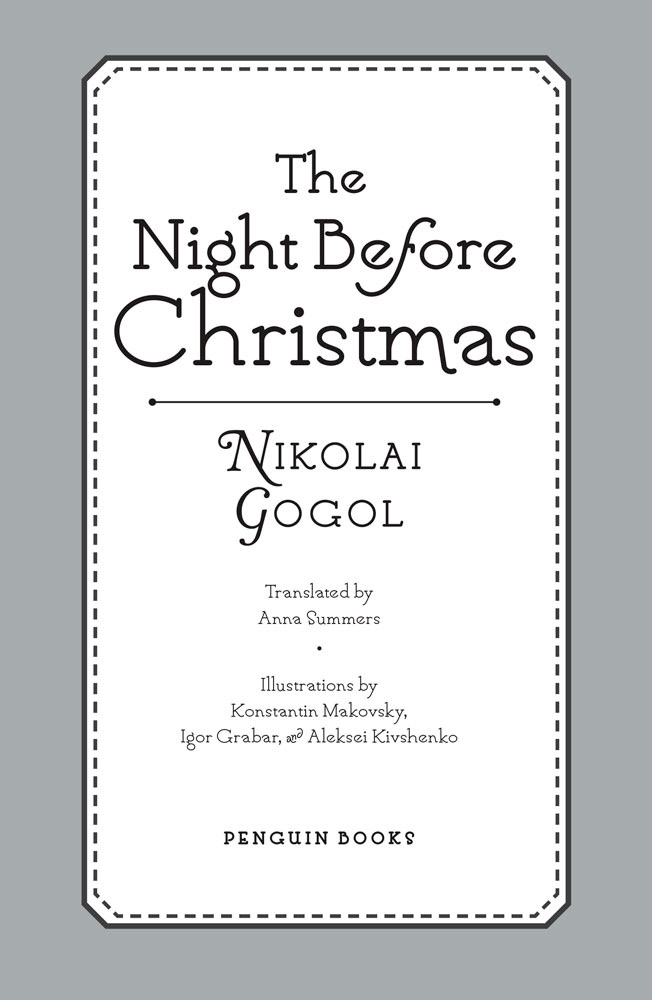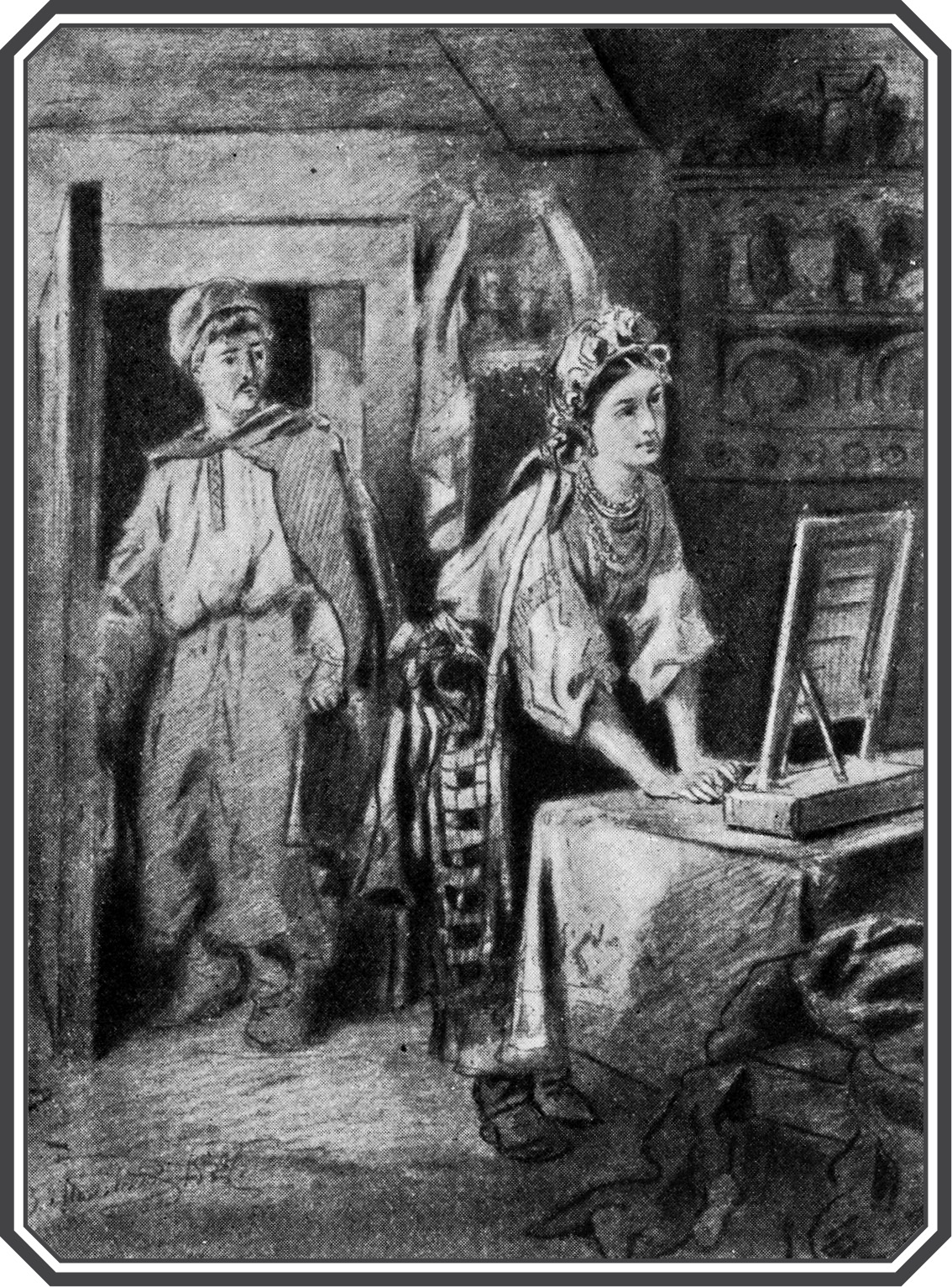The Night Before Christmas
Read The Night Before Christmas Online
Authors: Nikolai Gogol




Written in 1831 by the father of Russian literature, this uproarious tale tells of the blacksmith Vakula's battle with the devil, who has stolen the moon and hidden it in his pocket, allowing him to wreak havoc on the village of Dikanka. Both the devil and Vakula are in love with Oksana, the most beautiful girl in Dikanka. Vakula is determined to win her over; the devil, equally determined, unleashes a snowstorm to thwart Vakula's efforts. Zany and mischievous, and drawing inspiration from the folktales of Gogol's far-flung village in Ukraine,
The Night Before Christmas
is the basis for many movie and opera adaptations, and is still read aloud to children on Christmas Eve in Ukraine and
Russia.
PENGUIN CLASSICS
CLASSICS
The son of a small landowner,
Nikolai Gogol
(1809â52) became famous for his short stories, among them “The Overcoat” and “Taras Bulba” and those in the two volumes of
Evenings on a Farm Near Dikanka
, a collection based on Ukrainian folklore. He held a chair in history at the University of St. Petersburg, and in 1836, when his controversial comic play
The Inspector General
was produced, he was hailed by critics as the head of the Naturalist school. The next twelve years he spent in voluntary exile, mainly in Rome. His panorama of Russian life,
Dead Souls
, was published in 1842 and was an immediate success. Gogol spent ten years working on a sequel; it was never to see publication.
Â
Anna Summers
is the editor and translator of two books by Ludmilla Petrushevskaya,
There Once Lived a Mother Who Loved Her Children, Until They Moved Back In: Three Novellas
and
There Once Lived a Girl Who Seduced Her Sister's Husband, and He Hanged Himself: Love Stories
, and the coeditor and cotranslator of Petrushevskaya's
There Once Lived a Woman Who Tried to Kill Her Neighbor's Baby: Scary Fairy Tales
. Born and raised in Moscow, she now lives in Cambridge, Massachusetts, where she is the literary editor of
The Baffler
.
Â
Konstantin Makovsky
(1839â1915) was one of the most celebrated artists in the Russian Empire in the nineteenth century.
Â
Igor Grabar
(1871â1960) was a student of Konstantin Makovsky's and a celebrated painter in his own right. He later became one of the premier art administrators in the Soviet Union, personally advising Joseph Stalin.
Â
Aleksei Kivshenko
(1851â95) was a Russian painter acclaimed for his depictions of historical subjects, especially battles.


Published by the Penguin Group
Penguin Group (USA) LLC
375 Hudson Street
New York, New York 10014

USA | Canada | UK | Ireland | Australia New Zealand | India | South Africa | China
A Penguin Random House Company
This translation first published in Penguin Books 2014
Translation copyright © 2014 by Anna Summers
Penguin supports copyright. Copyright fuels creativity, encourages diverse voices, promotes free speech, and creates a vibrant culture. Thank you for buying an authorized edition of this book and for complying with copyright laws by not reproducing, scanning, or distributing any part of it in any form without permission. You are supporting writers and allowing Penguin to continue to publish books for every reader.
Illustration credits
All other illustrations by Konstantin Makovsky
LIBRARY OF CONGRESS CATALOGING-IN-PUBLICATION DATA
Gogol', Nikolai Vasil'evich, 1809â1852, author.
[Noch' pered Rozhdestvom. English]
The night before Christmas / Nikolai Gogol ; translated by Anna Summers ; illustrations by Konstantin Makovsky, Igor Grabar, and Aleksei Kivshenko.
pages : illustrations ; cm
ISBN 978-0-698-17093-3
I. Summers, Anna, translator. II. Makovskii, Konstantin Egorovich, 1839â1915, illustrator. III. Grabar', Igor' Emmanuilovich, 1871â1960, illustrator. IV. Kivshenko, Aleksei Daniilovich, 1851â1895, illustrator. V. Title.
PG3333.N63 2014
891.73'3âdc23
2014012788
Version_1
Â


T
HE DAY OF CHRISTMAS EVE ENDED, AND the night began, cold and clear. The stars and the crescent moon shone brightly upon the Christian world, helping all the good folks welcome the birth of our Savior. The cold grew sharper, yet the night was so quiet that one could hear the snow squeak under a traveler's boots from half a mile away. Caroling hadn't yet begun; village youths weren't yet crowded outside the windows waiting for treats; the moon alone peeked through, as though inviting the girls to finish up their toilette and run out onto the clean, sparkling snow. Just then one of the chimneys began to belch clouds of black smoke, and along with them, straddling a broom, flew out a witch. If Sorochintsy's property assessor happened to be passing
by on a troika of horses in his resplendent winter attire, he surely would have noticed the witch, for that remarkable man noticed everything: every piglet, every bolt of cloth in a housewife's trunk, each household article her husband left at the tavern on Sunday. But, unfortunately, the assessor wasn't anywhere in the vicinity, and why would he be? He had his own district to mind.
Unnoticed, the witch rose so high that one could see only a little speck darting here and there, blotting out the stars. The witch collected a whole sleeve full of stars; there were only three or four left in the whole sky. Suddenly another dot appeared in the distance and quickly expanded, turning into something so odd that even if you put on glasses the size of cart wheels you wouldn't have believed what you were seeing. From the front, the new creature looked like a regular German
*
: the narrow mug ended in a pig's snout that constantly twitched and sniffed the air; the thin legs seemed so brittle that if they belonged to the village
head of neighboring Yareski they'd snap the first time he danced a
kazachok
. From the back, the creature could be taken for a country attorney because of the long, thin tail that hung exactly like the tails on today's civil-service uniforms. Only the goatee, the small horns, and the creature's extreme griminess betrayed the truth: that this was no German or country attorney but just an ordinary devil who had one night left to roam among Christian folk and teach them devilish tricks. Tomorrow, at the first peal of church bells, he'd curl up his tail and scurry back to his lair.
The devil flew up to the moon, reached out and tried to grab it, but must have burned his fingers, for he hopped on one leg, sucking on his hand. He walked around it and tried again from the other side, and again jumped back. But the sly one didn't give up: he suddenly grabbed the moon with both hands and, juggling it like a hot pancake, stuffed it in his pocket, and flew off as though nothing had happened. In our village of Dikanka, no one noticed the theft. True, when the district scribe crawled out of the tavern on all fours he thought he saw the moon dancing in the sky, but who would believe him?
You'll ask me: why, for what wicked purpose did that evil creature perpetrate such an unconscionable act? I'll tell you. He knew that the deacon had invited Cossack Chub to a holiday dinner, which besides traditional
kutya
featured spiced vodka, saffron vodka, and other delectables. The guest list included Dikanka's village head; the deacon's kinsman, who owned a blue frock coat and sang the deepest notes in the bishop's choir; Cossack Sverbyguz; and many other prominent citizens. During that time Chub's beautiful daughter, Oksana, would have stayed home all by herself and would probably have received a visit from her admirer, blacksmith Vakula, who aggravated the devil even worse than Father Kondrat's sermons.
In his spare time, you see, the blacksmith dabbled in painting and actually enjoyed a considerable local reputation. The late Captain L. summoned him all the way to Poltava to paint his fence; every soup bowl in the village featured his brushwork. Even today you can find one of his icons in the church at the village of T. The pinnacle of his art was agreed to be a large panel inside the church porch, which depicted St. Peter expelling the devil from hell on the day of the
Last Judgment. Faced with imminent death, the terrified devil darts here and there, while the forgiven sinners bash him with whips and sticks. The devil tried everything to stop Vakula from finishing the hateful portrait, shoving his hand, blowing soot on the panelâbut despite his heartiest efforts the painting was completed and nailed to the church wall, and since then the devil swore to take revenge on its creator. For only one more night could he roam freely and look for a way to pay Vakula backâhence the moon theft. He reasoned that Chub was lazy and hard to stir to action, and that the deacon lived not too closeâall the way around the village, past the mill, past the cemetery, and around the ravine. On a moonlit night, maybe, spiced vodka could induce Chub to leave his warm bunk above the oven and undertake such a lengthy walk, but on a moonless nightâunlikely. The wicked blacksmith didn't get along with Chub and, despite his enormous strength, wouldn't dare visit Oksana if her father were at home.
As soon as the moon disappeared into the devil's pocket, it became so utterly dark that no one could have found his way to the village tavern, let alone the
deacon's house. The witch, finding herself surrounded by blackness, shrieked in fear, but the devil sidled up to her, took her gently by the arm, and whispered what men all over the world whisper to the fair sex. Can you believe itâthe devil flirting? But that's lifeâeveryone strives to imitate everyone else. Take our town, Mirgorod. It used to be that only the judge and the mayor owned fancy fur coats, while all the smaller fry wore plain sheepskin and didn't complain. These days, the assessor and junior magistrate both strut around in curly lamb covered with blue broadcloth; God knows how they afford it. Just three years ago I saw the lowly town clerk and district scribe shell out no less than six rubles a yard for some blue crepe de chine; the sexton, I've heard, commissioned wide nankeen
shalwar
pants and a striped worsted vest for the summer. What can I say? Every living creature wants to get on in the world, and the devil was no exception. The most grating aspect of his vile behavior was that he obviously fancied himself a sharp-looking fellow, whereas in truth it hurt one's eyes to look at him. But then the sky and everything below it grew so
hopelessly dark that we couldn't tell you what happened between the handsome couple.
*Â Â Â *Â Â Â *
“S
o,
kum
,
*
you haven't seen the deacon's new place yet?” Chub addressed the tall, thin peasant in a short sheepskin, whose stubble hadn't been touched for at least two weeks by the piece of scythe that muzhiks use for a razor. “We'll have us a nice party there, I bet. I just don't want to be late.” Chub tightened his belt, pulled down his hat, picked up his riding cropâthe chief enemy of the idle village dogsâand was about to step off the porch when the sudden blackness stopped him in his tracks.
“What the . . . Look, Panas, the moon's gone.”
“So it is,”
kum
agreed phlegmatically.
“Right, and you just accept it, like that's the way it should be?”
“Well, what else can I do about it?”
“What devil has done this to the moon, I want to know? May he never have a shot of vodka in the morning,” Chub cursed, wiping his moustache. “As if to mock us! I checked right before going outâa beautiful night, brighter than daylight. Now I put one foot out the door, and it's as if I've gone blind.”
Chub grumbled for a while, considering the next step. He was dying to have a good chat with the deacon's other guests: Mikita the tar trader, for one, who traveled to Poltava every two weeks and brought back such jokes that all villagers split their sides from laughter. A full bottle of spiced vodka also caressed his imagination. The overall picture was very tempting, but the blackness of the night provoked his bottomless laziness, and he pictured even more vividly his warm cot and himself in it, smoking a pipe and listening through the doze to the carolers outside. If he had been alone he would have stayed, without a doubt, but
kum
's presence made such an obvious display of laziness rather awkward. Chub finished cursing and addressed his
kum
again. “So no moon, eh?”
“None.”
“Wonders. Can I have a pinch of your snuff? Such nice tobacco you always have; where do you buy it?”
“Nice? Wouldn't make an old chicken sneeze,”
kum
complained, closing his bark snuffbox.
“I remember old innkeeper Zozulia once brought tobacco from Nezhin. What a tobacco it was! So, what shall we do,
kum
? Dark outside.”
“Let's stay in,”
kum
decided, and placed a hand on the door.
If
kum
hadn't said that, Chub would have certainly stayed, but now he just had to do the opposite. He took a decisive step off the porch. Immediately he regretted it but consoled himself that at least
he
had made the decision.
Kum
expressed no disappointment or surprise; he just sighed, scratched his back with a stick, and the two
kums
set off for the deacon's.
*Â Â Â *Â Â Â *
N
ow, let's see what Chub's beautiful daughter is up to.
Oksana wasn't yet seventeen. The whole worldâthat is, both sides of Dikankaâtalked about her beauty. Young men followed her in hordes, and even if
she wore a potato sack she would have outshined all other girls. Oksana knew her reputation and behaved accordingly. Little by little her admirers lost patience and settled for less unattainable objectsâall except Vakula, who continued his pursuit despite being treated as badly as the rest.
After her father left, Oksana sat for a long time at her little mirror, transfixed by her charming reflection. “Why did people decide to call me pretty? They just made it up; I'm not pretty at all.” But the fresh face in the mirror with its shining black eyes and a charming smirk immediately proved the opposite. “Still, do they really think my eyes have no equals? And my lips? My nose? And what's so good about my raven braids? At night one might get scared by the way they wrap around my head like two serpents. No, I know I'm not beautiful at all.” But the stunning reflection caught her eye again. “Of course I'm beautiful! How happy I'll make my husband! He'll forget himself, he'll choke me with kisses.”
“Incredible,” Vakula said to himself, entering the house quietly. “For a whole hour she's been staring at herself and still hasn't had
enough.”

“Is there anyone worthy of my beauty among those clowns?” Oksana continued. “Look how gracefully I walk, look at the ribbons in my hair, look at the rich gold braid my father bought me so I could marry the first among men!” At this she smirked again, turned around, and saw Vakula. The beauty frowned, blushing with annoyance, and the combination increased her loveliness to such a degree that no less than a million kisses could have done it justice.
“I see you got here fast enough. You all do, the moment father is out the door. Now, is my trunk ready?”
“It will be ready, my heart, as soon as the holidays are over. For two days I worked on it, didn't leave my smithy. The iron I used on it I didn't use even on the captain's carriage back in Poltava. And the decorations on itâyou can walk everywhere and not find such beauty. Red and blue flowers all over it. Please don't scold me. Just let me look at you for a moment.”
“Who forbids you to look?” Sitting down again on the bench, Oksana took up her mirror and examined anew her necklace, her braids, and her new blouse, and an expression of satisfied vanity lit up her features.
“May I sit next to you?” Vakula asked timidly.
“Go ahead,” Oksana replied without changing expression.
“My wonderful, incomparable beauty, allow me to kiss you just once,” the emboldened Vakula begged, pulling her toward him, but the moment the silky cheek seemed within his reach he was shoved away.
